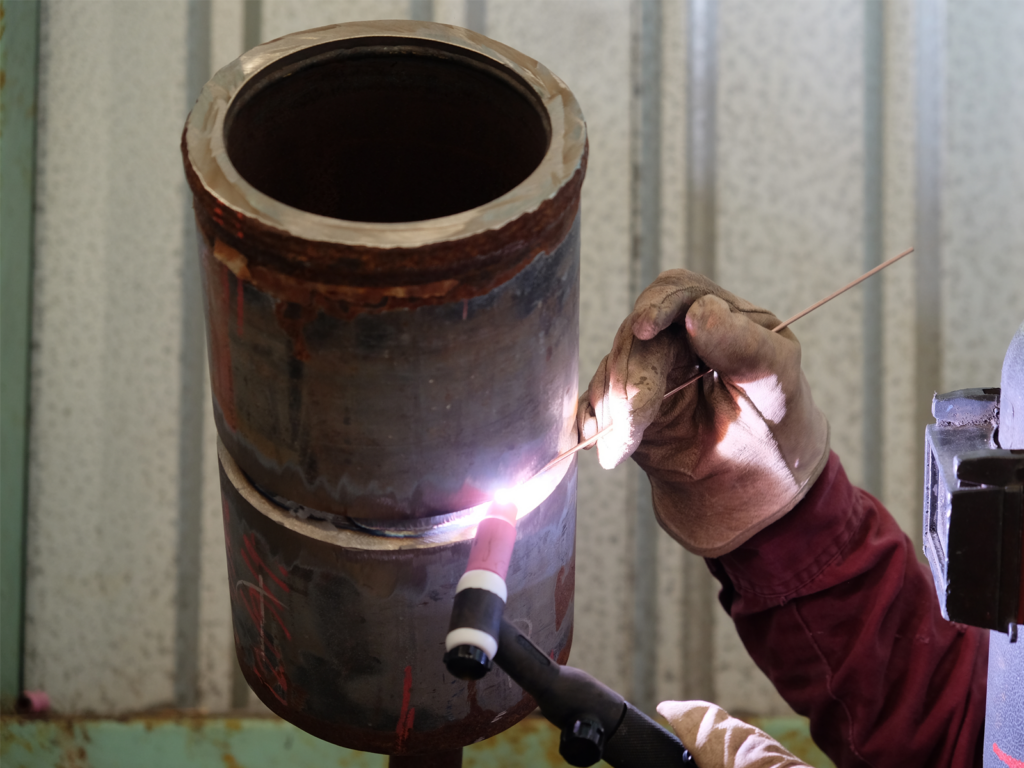The 6G welding certification test simulates real-life conditions so an inspector can observe whether a potential welder follows standards and meets the requirements of the profession. When welding professionally, a welder may encounter fixed components, such as a pipeline system or a large structure. In the 6G position, the pipe or plate is fixed at a 45-degree, so the welder must demonstrate the ability to weld successfully in a combination of other positions:
Welders with 4G welding certification benefit from increased work opportunities. A certification proves the welder is dedicated to the safe and proper protocol for this difficult weld and other groove and fillet welds in other positions.
Support for Welder Certifications
ATS supports clients during a critical moment in their professional careers by providing:
- Certification test venue, complete with popular equipment
- Certified weld inspector (CWI) observations and recommendations
- Weld quality testing
Welding Venue and Equipment
Our brightly lit welding booths are an ideal venue for a certification test. Welders who test at our facilities have access to the equipment required for popular welding methods, such as stick welding (SMAW), GTAW (TIG), MIG (GMAW), and FCAW.
On the day of the certification test, welders can choose to bring a coupon to the ATS facility or purchase a pipe or plate coupon from the ATS collection. Our stock consists of the most popular metals used for certification tests.
CWI Observations
A Certified Welding Inspector (CWI) from ATS can observe the certification test and determine if the weld passes or fails inspection. ATS employs qualified professionals with experience in welding and weld testing who can recognize if a weld meets quality standards and if a welder follows safety regulations, industry standards, and other relevant procedures. This includes watching if the welder sets up the equipment and prepares the welding area according to safety guidelines, uses the proper technique when using the equipment during the different passes, and keeps a clean workplace and clean weld throughout the process.
Weld Quality Testing
After the weld is complete, ATS can further support the certification process through our mechanical and materials testing labs. Our labs are ISO/IEC 17025:2017-accredited to perform a variety of destructive tests and nondestructive inspections.For a weld to pass the certification test, a CWI must evaluate the test coupon’s qualities. For example, an effective weld should not have inconsistencies from corrosion, pitting, or incomplete penetration. The weld should also be free of noticeable slag and spatter.
ATS’ staff of professional welders, engineers, and chemists frequently test welds for desirable characteristics, such as strength and ductility, through mechanical and material tests, including:
- Bend testing
- Charpy impact testing
- Chemical analysis
- Corrosion testing
- Drop weight impact testing
- Hardness testing
- Load testing
- Macro etch
- Tensile testing
To identify defects like cracking, ATS uses nondestructive inspection methods, including:
About ATS Lab Services
ATS is a rapidly expanding firm that offers consulting engineering, calibration, inspection, and testing services. Our growing Family of Companies allows us to reach clients with diverse needs from coast to coast. We can support businesses on a national and international scale.
Our experts provide inspections and testing for various industries, such as:
- Aerospace
- Defense
- Oil and Gas
- Automotive
- Manufacturing
- Shipbuilding
- Construction
- Nuclear
The ATS lab is A2LA and NADCAP-accredited to perform a variety of tests. For more information, click here.
Contact Us
Call +1 (888) 287-5227 or complete the form on this page to schedule welding certification and quality testing for welds in any position. ATS is proud to support our clients’ professional achievements and continuous growth.



